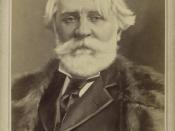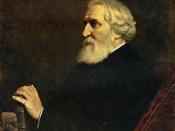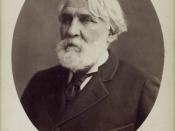Events which Turgenev describes in the novel, happen in the middle of the nineteenth century. That was time when Russia experienced the next epoch of reforms. In fact, "Fathers and sons" maintains reformism but he describes the very exact problems, inevitably connected with it. The main problem put by the writer in the novel, already sounds in its name: "Fathers and sons ". This name has double sense. On the one hand, it is a problem of generations - an eternal problem of the classical literature, on another hand - the conflict of two sociopolitical forces operated in Russia in 60th years: liberals and nighilists. Bazarov was a real representative of nihilists and during all the novel he argues with Pavel Kirsanov who was the liberal of the generation of 1840s about the nature of nihilism. This argue reflects the conflict existed in Russia between the liberals - Fathers and nighilists - sons Turgenev considered it to be a real problem, that's why he described such situation in his novel.
"Aristocratism, - Bazarov says, - Just think how many foreign...and useless words!" (Turgenev) Bazarov told Pavel that he would leave nihilism when Pavel would show him "...a single institution of contemporary life, either in the family or in the social sphere, that doesn't deserve absolute and merciless rejection." (Turgenev)
In fact no social, political, state forms of a human hostel absorb the moral maintenance of the family beginning. On the contrary, the family beginning appears grain and a fundamental principle of all complex forms of the society. The next important theme is despotism and human exploitation. Bazarov tells Arkady that "...they, that is, my parents, are occupied, and don't worry in the least about their own insignificance; they don't give a damn about it...


